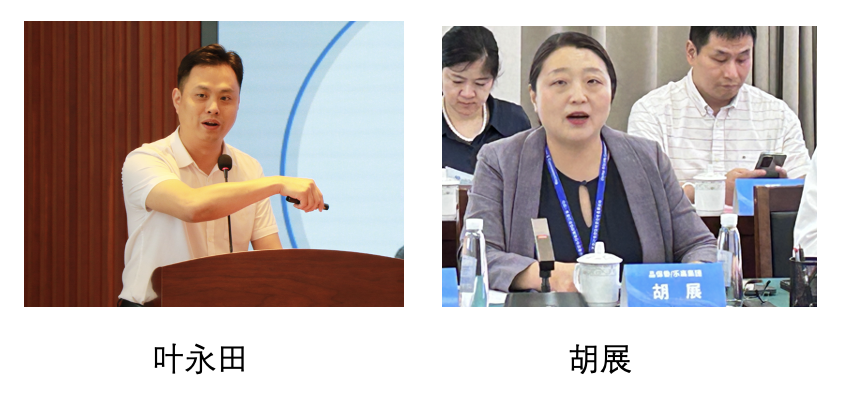On the afternoon of July 18, the Quality Brands Protection Committee of China Association of Enterprises with Foreign Investment (QBPC) and the Office of the Guangxi Leading Group on the Fight against IPR Infringement and Counterfeiting (Guangxi LGO), Wuzhou Administration for Market Regulation (AMR) and the Administrative Committee of Guangdong-Guangxi Cooperation Special Pilot Zone (Wuzhou) jointly organized the Symposium on Administrative Protection of Intellectual Property in Wuzhou City, Guangxi. Hu Zhan, QBPC Government Affairs and Public Policy Committee (GAPPC) Chair, moderated the event, which was attended by 25 QBPC members.
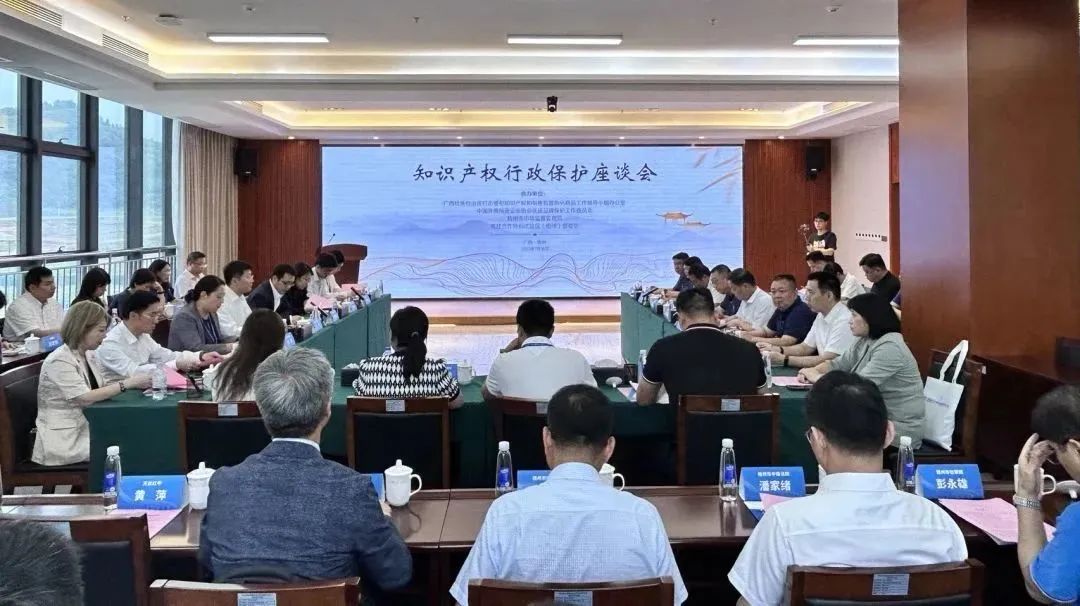
First of all, Michael Ding, Chair of QBPC, Tao Yaofeng, Deputy Director-General of Guangxi Zhuang Autonomous Region Administration for Market Regulation (Guangxi AMR) and Liang Qin, Deputy Director-General of Wuzhou Municipal Government made opening remarks successively.
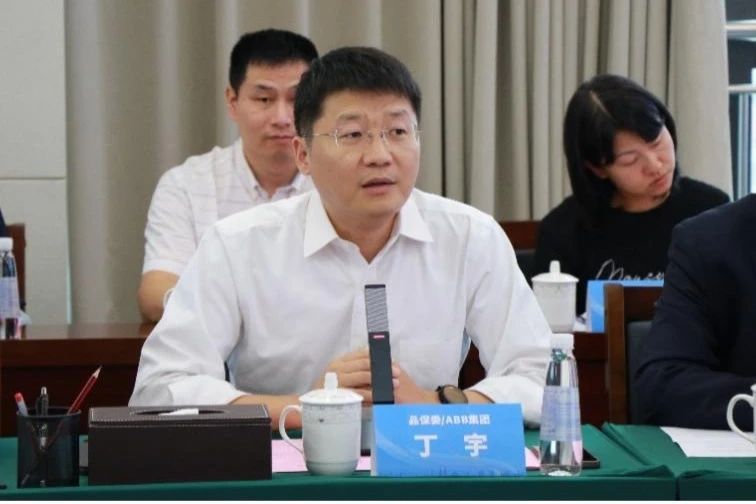
Michael Ding
Michael Ding briefly introduced the history, organizational structure, membership composition and tasks of QBPC. He said that the symposium was a new starting point for further cooperation between QBPC and Guangxi LGO after signing the MOU last November. QBPC would like to join hands with all parties to protect IPR and promote the optimization and development of an IPR-friendly business environment.
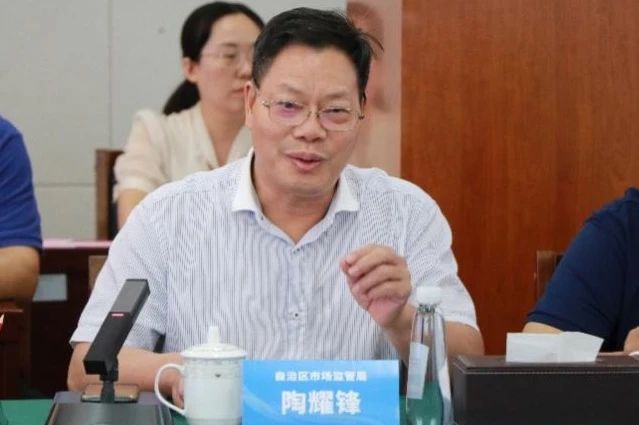
Tao Yaofeng
Tao Yaofeng said that Guangxi administrative and judicial organs at all levels attached great importance to IPR protection and had taken a series of tough measures in combating infringement and counterfeiting as well as protecting foreign investment. At the same time, QBPC had repeatedly assisted Guangxi AMR, Public Security Department, Customs and other departments in contacting right holders to provide appraisal materials, carry out exchanges, etc., which set up an efficient communication platform in the field of intellectual property protection and relevant administrative and judicial practice.
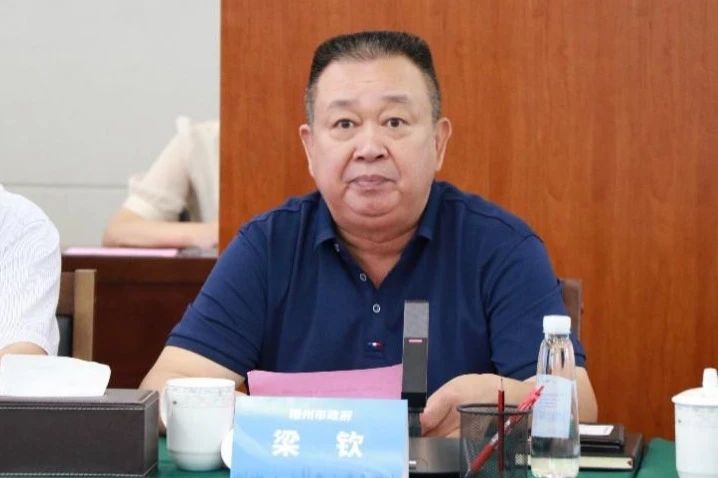
Liang Qin
Liang Qin shared information on Wuzhou City's history and culture, location conditions, and industrial foundation. He said that Wuzhou had always attached great importance to the protection of IPR, and in recent years it had investigated and handled a number of major cases selected by the State Administration for Market Regulation (SAMR). The city's comprehensive protection of IPR had been further improved.
Then, representatives of Guangxi Zhuang Autonomous Region High People’s Court, Procuratorate, Public Security Department and Nanning Customs briefly introduced their IPR protection work.
Lai Zhengzhi, Deputy Chief Judge of the First Criminal Tribunal of the High People’s Court of the Guangxi Zhuang Autonomous Region, introduced the trial of cases involving IPR accepted by the Court and its approaches. He said that the number of civil disputes over IPR had declined in recent years, mainly due to beefing up the management of sources of litigation, diversified dispute resolution, and the efforts to punish criminal acts of infringement and counterfeiting, which had created deterrence. Meanwhile, the emergence of some new technologies had led to a continuous increase in Internet-related cases. The Court attached great importance to the judicial protection of IPR in four aspects: firstly, it protected the property rights of enterprises equally in accordance with the law, and optimized the business environment under the rule of law. Secondly, it adjudicated civil disputes involving copyrights and patents in accordance with the law in order to maintain a market environment of fair competition. Third, resolving administrative disputes involving IPR in accordance with the law, standardizing administrative management, and formulating comprehensive IPR protection. Fourth, it adhered to the general policy of severe punishment in accordance with the law, and vigorously combated crimes against intellectual property rights.
Cheng Rui, Deputy Director-General of the Fourth Procuratorate Department of Guangxi People's Procuratorate, introduced the status and practice of the IPR protection work of the procuratorial organs of Guangxi. The Procuratorate had set up a leading group for IPR work and its office, and had carried out in-depth and solid IPR procuratorial work based on the principle of serving and guaranteeing the implementation of the innovation-driven development strategy. In the past three years, the procuratorial organs had insisted cracking down on crimes of infringing IPR through case handling, and handled an increasing number of criminal cases. In addition, Guangxi procuratorate organs and public security authorities, administrations for market regulation and other departments established a liaison mechanism and jointly took a green channel for IPR protection in order to achieve high-quality development. At the same time, the department vigorously strengthened the construction of IPR team, held trainings with the trial, investigation and administrative departments, and constantly improved the expertise on IP protection, strengthened scientific research cooperation with colleges and universities for full integration of prosecutorial resources and teaching and research resources, with the help of the "think tank" in order to stimulate two-way synergy of IP law protection. In the next step, the procuratorial authorities would further promote the cross-department collaboration mechanism to further strengthen the protection of IPR.
Tan Xingyi, Deputy Director of the Food, Drug and Environment Crime Investigation Department of the Public Security Bureau (Guangxi FDECID), briefly reported on the criminal protection of IPR and obstacles. In recent years, public security organs at all levels in Guangxi had always maintained a tough and high-pressure stance against infringement and counterfeiting crimes, deployed at the top level to strengthen coordination and promote the formation of an integrated operational pattern from the top to the bottom levels. Focusing on the problems, they docked with the right holders, collected infringing clues extensively through multiple channels, and cracked down on the source of the crime in depth. For example, seven types of cases, including counterfeit cigarette registered trademarks, counterfeit international brand perfumes and watches, were recognized by the autonomous region. In addition, they worked with administrations for market regulation to form a joint force for crackdown and rectification, cross-city cluster investigation and cross-departmental joint crackdown, which had enabled relevant departments to form a joint force, and explored the cooperation mode of criminal crackdown, administrative punishment as well as industry rectification. At the same time, they had strengthened the connection between administrative and criminal procedures through working with the procuratorate, courts, customs and AMRD to strengthen communication, improve the mechanism of two-way transfer, He also mentioned that the public security organs actively expanded cooperation between police and enterprises, drawing on the experience of advanced provinces and cities, and successively established a clue-sharing mechanism with right holders, effectively broadened the sources of cases, and jointly solved a number of infringement and counterfeiting crime cases. He said that he would take this symposium as an opportunity to closely strengthen collaboration with all parties, and also hoped that the rights holders would provide valuable experience for the public security authorities in combating infringement and counterfeiting and send high-quality clues, so as to make greater contributions to the protection of intellectual property rights and the promotion of high-quality development.
According to Zhang Chi, Deputy Director of General Affairs Division of Nanning Customs, in recent years, Nanning Customs had carried out IP protection work in three main aspects. The first is to carry out various types of special actions to protect IPR, and strengthen the monitoring on infringement risks in key ports, key commodities and key channels. Secondly, it actively carried out customs training with right holders. In April, the Fuzhou, Xiamen and Kunming Customs held a joint online training on customs protection of IPR, and established a good training mechanism with more than 50 QBPC member companies, introducing the identification of infringing commodities and investigation knowledge in the training sessions, and sharing cross-regional and cross-field infringing information, dynamics and cases, so as to effectively enhance the level of law enforcement by the Customs. Third, to create a good momentum for the protection of IPR. During the World IP Week, a series of activities such as customs IPR legal counseling, policy promotion and training courses had been carried out. He expressed the hope that all right holders could strengthen close cooperation with the Customs and take the initiative to provide more clues to accurately combat infringement. Nanning Customs protected the IPR of foreign investment enterprises and served the high-quality development of the export-oriented economy in the comprehensive protection zone.
Afterwards, Leon Lyu, Vice Chair of GAPPC and a representative of QBPC Automation & Electric Industry Working Group (A&E IWG), firstly thanked the court, procuratorate, public security organs and customs for their attention to IPR protection and created a favorable business environment for foreign-invested companies in China. Then, he briefly introduced his company's business and shared the problems faced by the industry in IPR protection, such as counterfeit refurbishment of industrial products, confusion of industrial trade names and infringement of trade secrets, etc.
During the exchange session, five representatives of QBPC members spoke in turn on the issues of trademark malicious application, special action to carry out criminal crackdown on IPR infringement in different fields, OEM and trademark infringement, how to apply the latest prosecution criteria for the crime of selling counterfeit registered trademarks, and the suggestions on how to carry out cross-border cargo monitoring for the right holders, locking up the suspected targets and collecting effective evidences. Representatives of relevant departments responded and provided guidance one by one. At the same time, they expressed the wish to join hands with the right holders of QBPC to continuously improve the IPR.

Next, Ye Yongtian, Director-General of Comprehensive Bonded Zone of Administrative Committee of Guangdong-Guangxi Cooperation Special Pilot Zone (Wuzhou), introduced the preferential policies of Wuzhou Comprehensive Bonded Zone and explained the business environment to the participants.
Finally, Hu Zhan summarized and thanked everyone for their active participation and wonderful exchanges, and especially thanked the Guangxi AMR, Wuzhou AMR, and Wuzhou Comprehensive Bonded Zone for their great preparation for the success of this symposium. She expected the participants to establish contact and deepen the follow-up cooperation in Guangxi afterwards, and at the same time, according to the theme of "China-ASEAN Cooperation Development Forum on Fighting Against IPR Infringement & Counterfeiting", relevant parties would jointly explore how to carry out the cooperation of IPR protection between China and ASEAN countries. Last but not least, Hu Zhan on behalf of QBPC invited the relevant authorities to participate in the QBPC 5th Dialogue on Administrative Protection of IPR of Foreign-Invested Enterprises , which would be held in Shanghai on November 7, and looked forward to seeing all soon.
